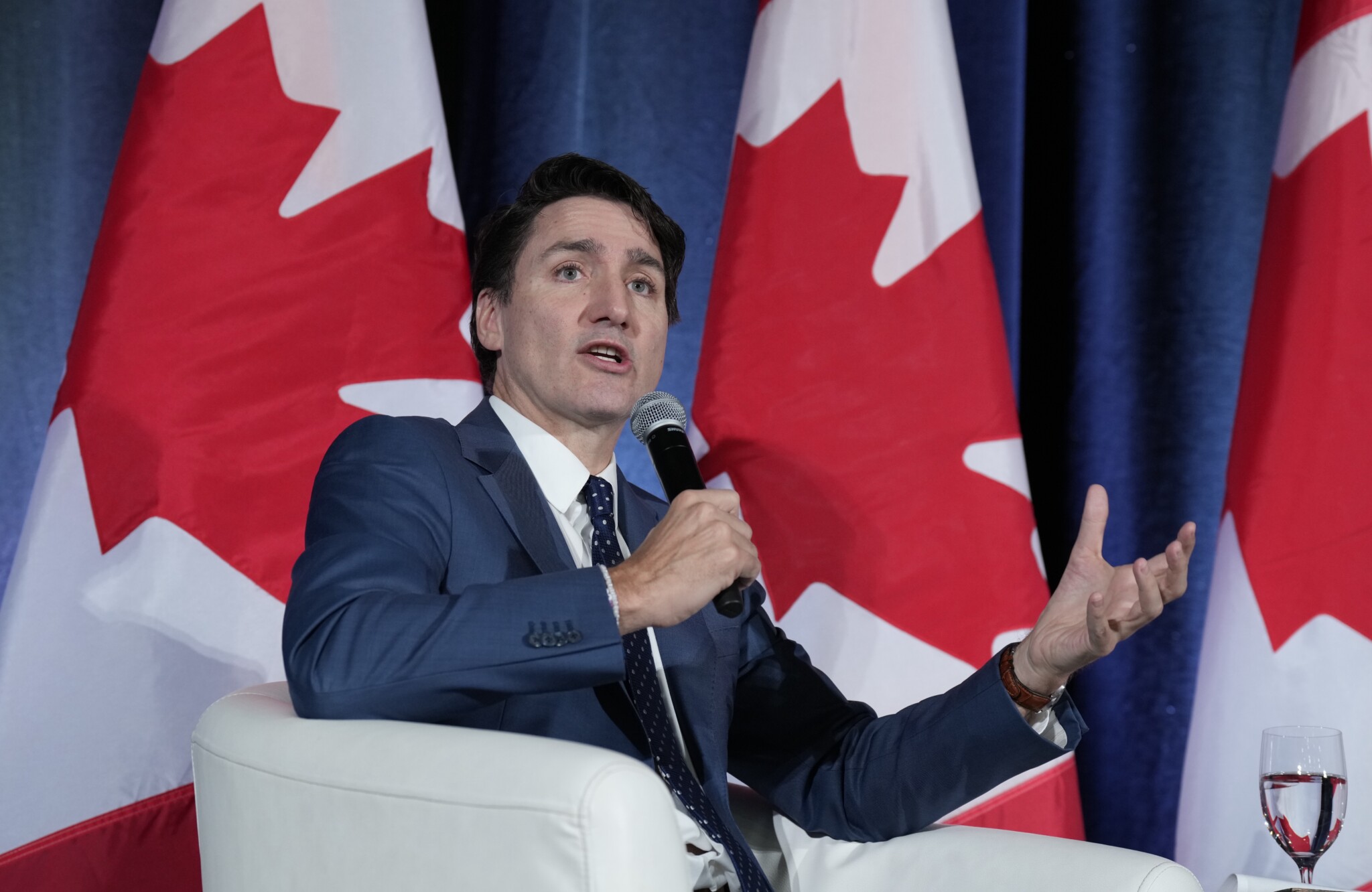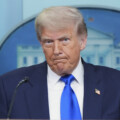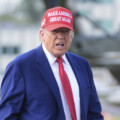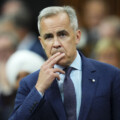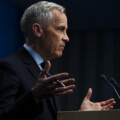There’s an old saying that there’s no such thing as an atheist in a foxhole. Today, this might be amended to: there’s no such thing as a post-nationalist in a foxhole. Indeed, this was borne out in Canada by the response of the current government and its acolytes to the potential economic crisis posed by President Trump’s announcement of tariffs.
Like protagonists in a Hemingway story belatedly discovering their manhood, these politicians had found within themselves a previously unknown penchant for patriotic passions. Once wary of such gauche displays of jingoism, they are now prepared to shed blood for their country to make sure the maple leaf on our flag stays red. “Welcome to the party,” said the Right. “You’re a bit late.”
After the flag waving, their knee-jerk response was an instinctive turn toward economic protectionism, with leaders at all levels of government putting out the notice to buy Canadian goods. The LCBO, at the behest of Ontario’s premier, went further, posting notices that it had pulled all U.S. spirits from its shelves (a veritable mini-crisis for this American writer, whose own preferred poisons are Yankee bourbon and rye).
We also saw a journalist ask Pierre Poilievre if he would withdraw his political challenge to the standing government, lest they be distracted from the matter at hand. This is not just generic nationalism but the more specific phenomenon of the rally-round-the-flag effect, in which anything that detracts from national unity is treated as a threat, including the operation of normal democratic politics. It is worth noting that in 1864, amidst the greatest national crisis it has ever known, the United States still held a presidential election. More intense still were the expressions of fury and accusations of treason against those who either allow that Trump has a point about the laxness of Canadian law enforcement at our shared border, or have suggested that Canada’s existing regulations will harm our ability to manage a trade war.
Thus we witnessed, in the span of 48 hours, a whirlwind tour of the various expressions of “nationalism” on the Left. And while the speed with which this crisis was averted (for now) lent a farcical air to the entire business, it nonetheless proved highly revealing. The reflexive version of nationalism that found expression reveals the conceptual emptiness of so much “postnational” or “genocidal” rhetoric that otherwise prevailed during the past decade. When the chips were down, good, old-fashioned Canadian jingoism is what even the most left-wing politicians had to fall back on. Even Jagmeet Singh took a break from luxury cars and Swiss watches to implore his fellow citizens to adhere to the new program of consumerist protectionism.
In a somewhat more emotional register, Prime Minister Trudeau evoked the mystic chords of memory, addressing the need for national pride and loyalty during our time of crisis, reminding his American counterparts of Canada’s significant legacy as a stalwart ally, especially in wartime.
“[F]rom the beaches of Normandy to the mountains of the Korean Peninsula, from the fields of Flanders to the streets of Kandahar, we have fought and died alongside you during your darkest hours,” he explained. “Canada is the greatest country on Earth. Long live Canada.”
These were not bad points, but they inevitably raise the question: where has this national pride been for the past decade or more?
This nationalist turn is not in itself remarkable. When Josef Stalin addressed the people of the Soviet Union following the surprise Nazi invasion in July of 1941, he did so primarily in the language of patriotism rather than socialism.
“Above all, it is essential that our people, the Soviet people, should understand the full immensity of the danger that threatens our country and should abandon all complacency,” he told his frightened populace, who until then had thought the Germans were their allies.
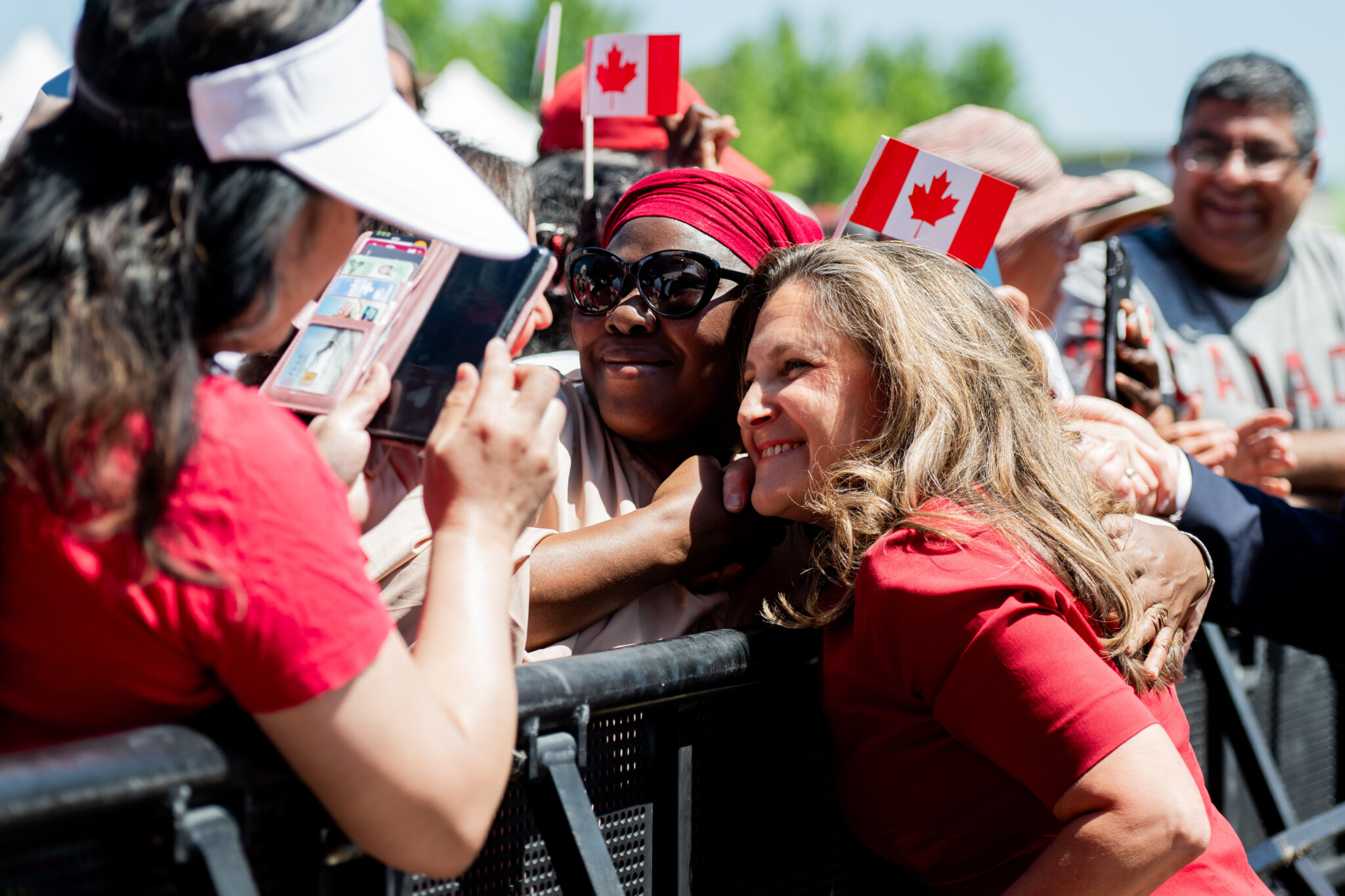
Chrystia Freeland takes a selfie with a guest during Canada Day celebrations at LeBreton Flats in Ottawa, on Monday, July 1, 2024. Spencer Colby/The Canadian Press.
It is all the more telling how swiftly Canada’s elites made the switch from supreme critics to intense nationalists upon briefly facing a far less severe crisis.
Many have called attention to the underlying hypocrisy of these appeals, given that these same elites had spent much of the past decade espousing their commitment to some nebulous vision of post-nationalism, accused their country of ongoing genocide, and suggested that some had co-opted their flag for fascist purposes.
But I think this is ultimately of lesser interest—after all, hypocrisy is the dominant currency of politics. What is more interesting is just what this Strange New Respect for nationalism betokens.
The problems here are both economic and philosophical. For the former, it’s all well and good to speak of the leverage Canada wields with its oil and gas resources, but without a single LNG export terminal, such leverage is highly notional. Canada simply hasn’t prepared for a moment like this. Similarly, it can insist that, in the face of foreign pressure, the Canadian government will step up to make its producers whole, but having failed to adequately grow the economy in recent years, the primary tools at its disposal are highly inflationary subsidies and handouts.
The deeper philosophical problem, however, is that after so many years of saying the country is rotten to its core or barely exists at all, these new Churchillian calls to come to the defence of the beleaguered nation ring hollow and are rooted in nothing substantive.
And it is not just the current Liberal government that is out of practice here. Across nearly all the country’s institutions— from universities to museums to banks—, one finds not just a typically self-effacing Canadian bashfulness, but a sense that there is something wrong with manifesting pride in one’s country and that true political sophistication involves a rejection of such pride.
Today, under the stress of Trump’s tariff threats, national pride is exactly what was wanted. But what emerged instead was a kind of instinctive, reactionary emotional nationalism, which is proving hostile to strategic analysis.
This sort of thing is always a loser. It is a loser not just because Canada has barely a tenth of the population of the United States and is unlikely to prevail in an economic contest. It is a loser because these expressions of nationalism inevitably render their users foolish. Anyone who doubts the general truth of this may consult the belligerent, anti-Canadian social media posts of various American Trump supporters during the past week, none of whom had previously evinced the slightest interest in either Canada or tariffs.Another way to think about this is that some form of national concern is simply inevitable, due to the basic structure of modern politics. Your interests—above all the preservation of your property and your life—are intrinsically tied to a given nation-state (and those without such a thing are generally in want of one). This is not always readily apparent, especially when times are good and even more especially for those who are unusually well off. But certain events have a way of illuminating such things.
The question now, following Canada’s brief spasm of national feeling, is whether this understanding can be sustained in a more persistent and reasonable way. A national energy strategy isn’t just something one should speak of in a moment of panic; it should be pursued when times are good because these are inherent resources that any sensible country should wish to capitalize on. Supporting the country’s industries should be a priority on its own terms, not because it momentarily sticks a thumb in its neighbour’s eye.
All of these and more are in some sense “national” considerations—the question is whether they are to be guided by a conscious understanding of a country’s interests or by momentary expediency. Or, to put it another way, it is no longer a matter of Canada (or any other country) choosing between a national or postnational identity, but of choosing what kind of nation it would be: prudent or imprudent.
